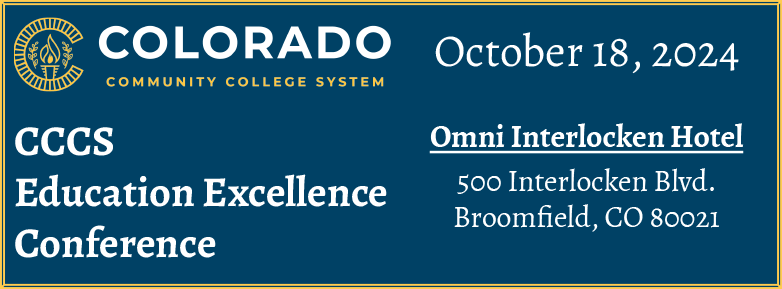1:55 PM – 2:45PM
Interlocken AB

Thieves and Forgers Wanted! Problem Base Learning for Intellectual Exploration and Profit!
Marty Church
Problem-based learning is proven to be a highly effective tool for deep learning, identifying and closing equity gaps, growing subject knowledge, and empowering students to solve complex problems through the power of contextualization, identifying needs and resources, self-advocacy, and frequent higher-order thinking. This session invites participants to EXPERIENCE what it feels like to work on a problem-based task and debrief with other educators on how and when to apply the lessons of problem-based learning into courses, curriculum, and student experience in a problem-based learning environment. Reflection opportunities to apply the lessons of problem-based learning to their own instruction.
Marty Church is English Faculty and Assessment Fellow at Front Range Community College, where he also serves as Instructional Coach and Student Learning Institute facilitator. Marty is passionate about working with developmental education students and closing equity gaps in higher ed.
Interlocken C
Leveraging Open Pedagogy in Response to AI
Mark Hussey, Kae Novak
Textbooks present educators with a few problems: They are expensive, they encourage passive absorption of knowledge, and they (often) reinforce the author’s position of privilege and power. Worse, the rapid emergence of AI technology threatens to render existing textbooks and even course learning outcomes obsolete. Open pedagogy turns these problems on their head by challenging students to leverage AI technology in the process of researching, writing, and publishing their own course texts. The result is that students gain much more than a free textbook; they play an active role in selecting, creating, and publishing the most relevant and up-to-date knowledge you can find.
Mark Hussey, English faculty and Online Instructional Coach at Front Range Community College. I have spent the last few years engaging with student-centered teaching and alternative grading practices, and most recently I have sought to apply those concepts towards helping teachers respond effectively to the rapid emergence of AI technology. Last summer, I received a CDHE “mini-grant” to develop an Open Pedagogy composition course themed around issues in AI. I am excited to share how this work can help engage students and provide teachers tools for facilitating inclusive and equitable – and even fun – learning experiences.
Kae Novak has fifteen years of experience in online learning and is the Assistant Director, Learning Design at Front Range Community College. She teaches multimedia, computer information systems, and marketing courses in the Colorado Community College Systems. She is the Co-Chair of the eLearning Consortium of Colorado and for the past three years has led the organization in its annual virtual and hybrid conferences. She is currently doing research on online learning, immersive learning experiences and social justice. Her most recent publication is co-authoring a chapter titled Constructivism for Active, Authentic Learning.
Interlocken D
Designing Online Group Work Through a UDL Mindset
Amanda Hardman
Many of us envision collaboration as a cornerstone of an effective face-to-face classroom environment but struggle to imagine how collaboration such as small group work is possible in an asynchronous online classroom. However, collaboration is a key teaching approach, whether your pedagogy is informed by andragogy, constructivism, active learning, or even Universal Design for Learning (UDL). We will explore how you can use EXPERT strategies (EXpectations, Process and Practice, Encouraging Autonomy, Reflection, and Templates) to give your online learners the structure and support they need to successfully complete small group activities and projects. We will give particular attention to UDL checkpoints that inform specific design and facilitation practices in our online courses.
Amanda Hardman is a senior learning designer at the Colorado Community College System, where she led a work group to create online course quality standards informed by principles of Universal Design for Learning and diversity, equity, and inclusion. She also teaches composition at Red Rocks Community College and a course on Universal Design for Learning at University of Denver, and it is design exploration through these current teaching experiences that inspired her current presentation.
Spruce
Colorado Math Pathways Task Force
Rachel Sefton
The Colorado Math Pathways Task Force brings together experts from across the high school grades and higher education. This effort builds on and extends the work of a previous task force convened by the CDHE that focused on the success of undergraduate students in mathematics courses. The Colorado Math Pathways Task Force receives technical assistance from the Dana Center at UT-Austin. The Dana Center selected Colorado in September 2022 as one of twenty-one states to join the latest Launch Years Initiative. The Colorado Math Pathways Task Force is working from February 2023 to February 2024 to write and publish a set of recommendations which will be communicated broadly to stakeholders through Spring 2024. This presentation will share information on the task force’s progress to this point and future plans.
Dr. Rachel Sefton holds a B.S., an M.S.T., and a Ph.D. in Mathematics Education. Currently the Chair of Mathematics & Engineering at the Community College of Denver, Dr. Sefton previously taught mathematics at the secondary level for seven years and the university level for four years before coming to CCD in 2015. She served as a co-chair of the CCCS MAT discipline from September 2021 to September 2023, and she serves as a co-chair of the latest Colorado Math Pathways Task Force.
Fir
Matters of Correctness: Giving Students Valuable Feedback Without Grading 24/7
Kathy Mennen
Students need timely and informative feedback. However, that doesn’t mean you must spend all your time grading. In this session, you will get tips on prioritizing assignments for grading, communicating the grading/feedback to students, and grading written assignments. You’ll also explore grading tools and several types of grading.
Kathy Mennen is Lead English Faculty on the Boulder County Campus of Front Range Community College. She has also served as statewide English Discipline Chair and member of the System Faculty Curriculum Committee (SFCC).
